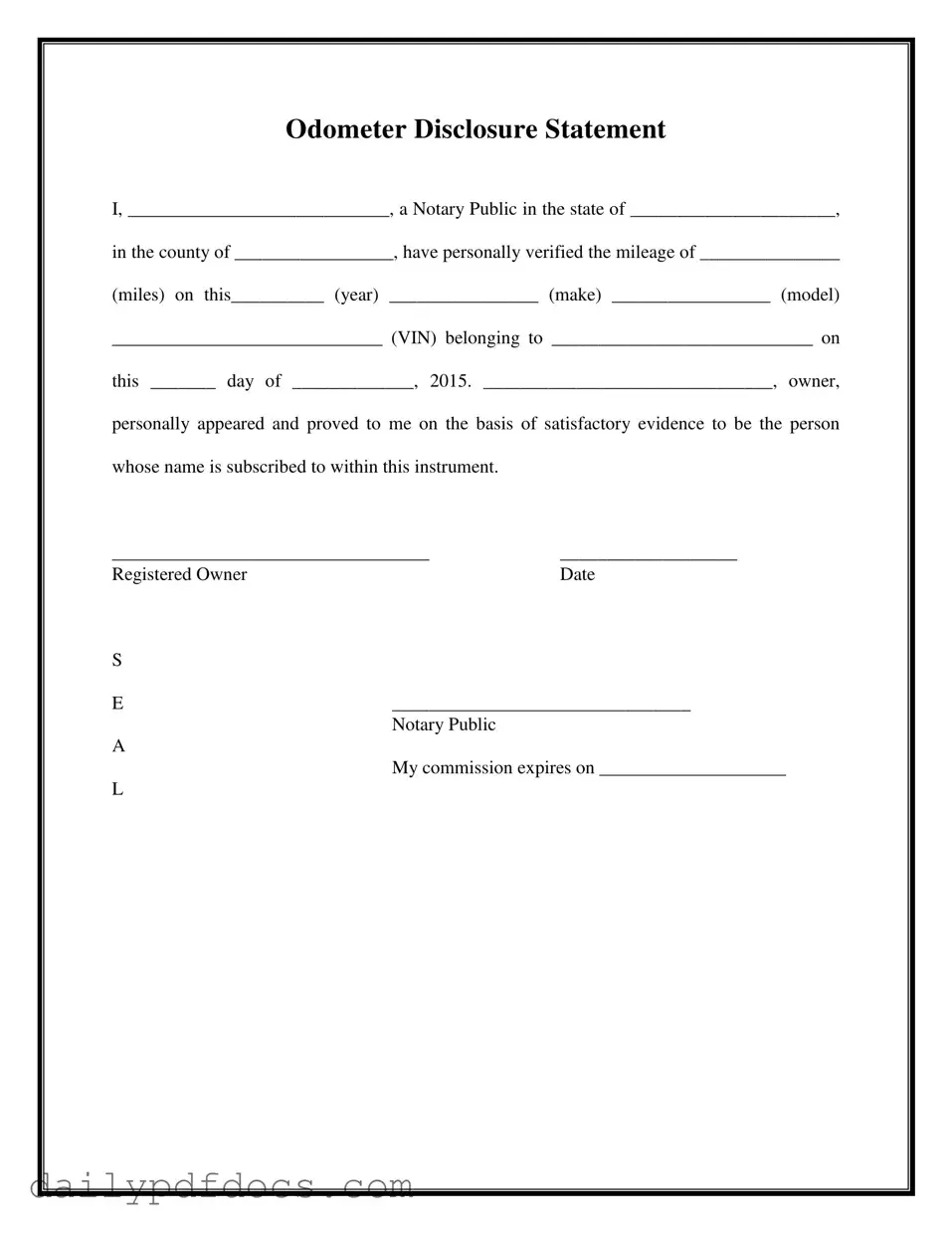Fill Your Notarized Odometer Statement Form
The Notarized Odometer Statement form serves as a crucial document in the process of buying or selling a vehicle. This form provides a formal declaration of the vehicle's mileage, ensuring that the information is accurate and legally binding. It is typically completed by a notary public, who verifies the mileage and confirms the identity of the vehicle's owner. The statement includes essential details such as the vehicle's year, make, model, and Vehicle Identification Number (VIN), alongside the recorded mileage at the time of the transaction. By signing this document, the seller attests to the authenticity of the mileage, which helps protect buyers from potential fraud. The presence of a notary adds an extra layer of credibility, as they witness the signing and validate the identities involved. Additionally, the form includes a section for the notary to indicate the expiration of their commission, ensuring that the notarization remains valid. Overall, the Notarized Odometer Statement is an important tool in the vehicle transfer process, safeguarding both parties and promoting transparency in transactions.
Find Other Documents
California Dmv Forms - The DL 44 includes sections to certify truthful information under penalty of perjury.
The Ohio Operating Agreement form is not only crucial for establishing the management structure and operational procedures of a limited liability company (LLC) in Ohio, but it can also be conveniently accessed through Ohio PDF Forms, which provides a clear template to help members understand their rights and responsibilities within the LLC, ensuring compliance and effective governance.
Cash Reciept - This form serves as proof of payment for cash transactions.
Common Questions
What is a Notarized Odometer Statement?
A Notarized Odometer Statement is a legal document that certifies the mileage of a vehicle at the time of sale. It is signed by the vehicle owner and notarized by a licensed notary public. This statement helps prevent fraud related to odometer readings, ensuring that buyers receive accurate information about the vehicle's mileage.
Why do I need a Notarized Odometer Statement?
If you are selling or transferring ownership of a vehicle, a Notarized Odometer Statement is often required by state law. It provides legal proof of the vehicle's mileage, which protects both the seller and the buyer. This document helps establish trust and transparency in the transaction.
Who can notarize the Odometer Statement?
Only a licensed notary public can notarize the Odometer Statement. Notaries are authorized by the state to witness the signing of documents and verify the identity of the individuals involved. You can typically find notaries at banks, law offices, or dedicated notary services.
What information is included in the Odometer Statement?
The Odometer Statement includes the following key details: the name of the notary public, the state and county where the notarization occurs, the verified mileage of the vehicle, the year, make, model, and Vehicle Identification Number (VIN) of the vehicle, and the name and signature of the registered owner. It also includes the date of notarization and the expiration date of the notary's commission.
Is the Notarized Odometer Statement required in all states?
Not all states require a Notarized Odometer Statement for vehicle sales. However, many do, especially for used cars. It's essential to check your state's specific requirements to ensure compliance and avoid potential issues during the sale process.
How do I fill out the Notarized Odometer Statement?
To fill out the Odometer Statement, start by entering your name as the notary public, the state and county where you are located, and the verified mileage of the vehicle. Next, provide the year, make, model, and VIN of the vehicle. The registered owner must then sign the document in front of the notary, who will complete the notarization with their signature and seal.
What happens if the odometer reading is inaccurate?
If the odometer reading is found to be inaccurate, it can lead to serious legal consequences. Both the seller and buyer may face issues, including potential fraud claims. It is crucial to ensure that the mileage is accurately reported on the Notarized Odometer Statement to avoid complications in the future.
Can I use a Notarized Odometer Statement for a vehicle I bought out of state?
Yes, you can use a Notarized Odometer Statement for a vehicle purchased out of state, as long as it meets the requirements of the state where you are registering the vehicle. Ensure that the document is properly completed and notarized to facilitate a smooth registration process.
Preview - Notarized Odometer Statement Form

ODOMETER DISCLOSURE STATEMENT
I, ____________________________, a Notary Public in the state of ______________________,
in the county of _________________, have personally verified the mileage of _______________
(miles) on this__________ (year) ________________ (make) _________________ (model)
_____________________________ (VIN) belonging to ____________________________ on
this _______ day of _____________, 2015. _______________________________, owner,
personally appeared and proved to me on the basis of satisfactory evidence to be the person whose name is subscribed to within this instrument.
__________________________________ |
___________________ |
Registered Owner |
Date |
S |
|
E |
________________________________ |
|
Notary Public |
A |
|
|
My commission expires on ____________________ |
L |
|
Similar forms
The Notarized Odometer Statement form serves a specific purpose in vehicle transactions, particularly in confirming the mileage of a vehicle. Several other documents share similarities with it in terms of their function and requirements. Here are nine such documents:
- Vehicle Title: This document proves ownership of a vehicle and often includes the odometer reading at the time of transfer. Like the Odometer Statement, it verifies essential details about the vehicle.
- Bill of Sale: A Bill of Sale documents the sale of a vehicle and may include the odometer reading. Both forms ensure that the buyer is aware of the vehicle's mileage at the time of purchase.
- DMV Odometer Disclosure Statement: This form is required in many states when transferring a vehicle. It serves a similar purpose to the Notarized Odometer Statement by confirming the mileage.
- Vehicle Registration Application: When registering a vehicle, this application often requires the odometer reading. Both documents aim to provide accurate mileage information to authorities.
- Power of Attorney for Vehicle Transactions: This document allows one person to act on behalf of another in vehicle transactions. It may include mileage verification, similar to the Notarized Odometer Statement.
- Transfer of Title Form: This form is used to officially transfer ownership of a vehicle. It often includes a section for the odometer reading, just like the Odometer Statement.
- Manufacturer's Certificate of Origin: This document is issued by the manufacturer and includes the vehicle's initial odometer reading. Both forms provide a record of mileage for verification purposes.
- Inspection Certificate: Some states require an inspection certificate that may include mileage verification. This document, like the Odometer Statement, helps ensure accurate vehicle information.
- Homeschool Letter of Intent: This document is essential for families choosing to homeschool, as it notifies the state of their decision and provides necessary information. It is comparable to the Notarized Odometer Statement in affirming official intent. For more details, visit https://homeschoolintent.com/editable-washington-homeschool-letter-of-intent.
- Warranty Deed for Vehicles: In some cases, a warranty deed may be used to transfer ownership and includes mileage information. Both documents serve to protect the interests of the parties involved in the transaction.
Misconceptions
Here are ten common misconceptions about the Notarized Odometer Statement form, along with clarifications for each:
- Notarization is optional. Many people think that notarizing the odometer statement is not necessary. In fact, it is often required to ensure the document is legally valid.
- Any notary can complete the form. Some believe that any notary can notarize any document. However, notaries must be familiar with the specific requirements of the odometer statement.
- The form is only for selling vehicles. Many assume the form is only needed during a sale. It can also be used for transferring ownership or when gifting a vehicle.
- Odometer readings don't need to be accurate. Some people think they can estimate the mileage. Providing an accurate odometer reading is crucial to avoid legal issues later.
- Notarized forms are only for new cars. There’s a misconception that only new vehicles require this form. In reality, it applies to both new and used vehicles.
- All states have the same rules. Many believe that the notarization process is the same across the U.S. Each state has its own laws regarding odometer disclosure and notarization.
- Once notarized, the form cannot be changed. Some think that changes cannot be made after notarization. While it’s best to avoid changes, corrections can be made if necessary.
- Notarization guarantees the accuracy of the odometer reading. People often think that notarization proves the mileage is correct. It only verifies the identity of the signer, not the truthfulness of the information.
- You can use a digital signature. Many assume that electronic signatures are acceptable for notarization. However, most states require a physical signature on the odometer statement.
- Notaries can provide legal advice. Some individuals think that notaries can explain the legal implications of the document. In reality, notaries are not allowed to give legal advice.
Understanding these misconceptions can help you navigate the process more smoothly. If you have any questions, it’s always best to consult a professional.
File Attributes
| Fact Name | Details |
|---|---|
| Purpose | The Notarized Odometer Statement is used to document the mileage of a vehicle at the time of sale or transfer. |
| Notary Requirement | A notary public must witness and verify the mileage to ensure the document's authenticity. |
| State-Specific Forms | Each state may have its own version of the form, and it is important to use the correct one based on your location. |
| Governing Law | In many states, the use of an odometer disclosure statement is governed by the Uniform Commercial Code (UCC) and state motor vehicle laws. |
| Owner Verification | The registered owner must personally appear before the notary to verify their identity and the accuracy of the mileage. |
| Information Required | The form requires details such as the vehicle's make, model, year, VIN, and the current mileage. |
| Legal Protection | This statement helps protect both the seller and buyer from potential fraud regarding the vehicle's mileage. |
| Expiration of Notary Commission | The notary public must indicate the expiration date of their commission on the form to validate their authority. |
| Record Keeping | Both parties should keep a copy of the notarized statement for their records, as it may be required for future transactions. |
